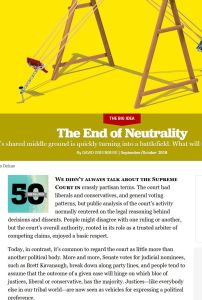Join getAbstract to access the summary!

Join getAbstract to access the summary!
David Greenberg
The End of Neutrality
Society’s shared middle ground is quickly turning into a battlefield. What will that do to democracy?
Politico Magazine, 2018
What's inside?
A loss of faith in neutral institutions has precipitated America’s polarized political discourse.
Recommendation
Even if you are only a casual follower of American politics, you will know that the nation’s political discourse is bitterly divided. But where does this polarized hostility come from, and what are its implications? In this timely article for Politico Magazine, historian and media studies expert David Greenberg charts the rise and fall of Americans’ faith in institutional neutrality, and the effects of these shifts on the US political landscape. getAbstract recommends this essay to those looking for a historical perspective on America’s daily political battles.
Summary
About the Author
David Greenberg is a professor of history and media studies at Rutgers University.


















Comment on this summary